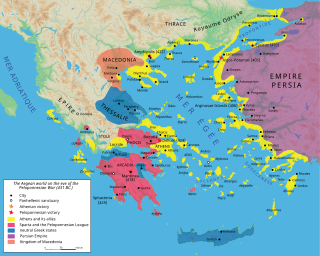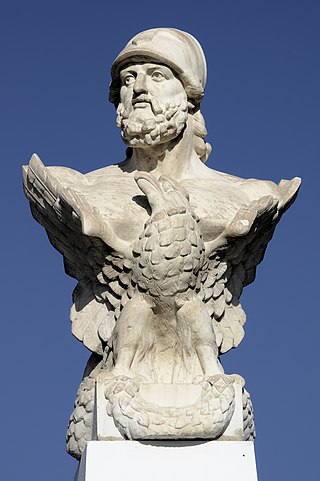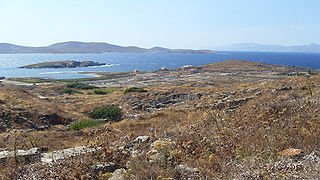
The Delian League was a confederacy of Greek city-states, numbering between 150 and 330, founded in 478 BC under the leadership (hegemony) of Athens, whose purpose was to continue fighting the Persian Empire after the Greek victory in the Battle of Plataea at the end of the Second Persian invasion of Greece. The League functioned as a dual –offensive and defensive– alliance (symmachia) of autonomous states, similar to its rival association, the Peloponnesian League. The League's modern name derives from its official meeting place, the island of Delos, where congresses were held within the sanctuary of the Temple of Apollo; contemporary authors referred to the organization simply as "the Athenians and their Allies".

The Peloponnesian War was an ancient Greek war fought between Athens and Sparta and their respective allies for the hegemony of the Greek world. The war remained undecided until the later intervention of the Persian Empire in support of Sparta. Led by Lysander, the Spartan fleet finally defeated Athens which began a period of Spartan hegemony over Greece.

The 5th century BC started the first day of 500 BC and ended the last day of 401 BC.

Pericles was a Greek politician and general during the Golden Age of Athens. He was prominent and influential in Ancient Athenian politics, particularly between the Greco-Persian Wars and the Peloponnesian War, and was acclaimed by Thucydides, a contemporary historian, as "the first citizen of Athens". Pericles turned the Delian League into an Athenian empire and led his countrymen during the first two years of the Peloponnesian War. The period during which he led Athens as Archon (ruler), roughly from 461 to 429 BC, is sometimes known as the "Age of Pericles", but the period thus denoted can include times as early as the Persian Wars or as late as the following century.
This article concerns the period 479 BC – 470 BC.
This article concerns the period 469 BC – 460 BC.
This article concerns the period 459 BC – 450 BC.
This article concerns the period 449 BC – 440 BC.

This article concerns the period 409 BC – 400 BC.
This article concerns the period 439 BC – 430 BC.

This is a timeline of ancient Greece from its emergence around 800 BC to its subjection to the Roman Empire in 146 BC.

Year 400 BC was a year of the pre-Julian Roman calendar. In the Roman Republic, it was known as the Year of the Tribunate of Esquilinus, Capitolinus, Vulso, Medullinus, Saccus and Vulscus. The denomination 400 BC for this year has been used in Europe since the early medieval period, when the Anno Domini calendar era became prevalent there.
Year 469 BC was a year of the pre-Julian Roman calendar. At the time, it was known as the Year of the Consulship of Priscus and Caeliomontanus. The denomination 469 BC for this year has been used since the early medieval period, when the Anno Domini calendar era became the prevalent method in Europe for naming years.

Cimon or Kimon was an Athenian strategos and politician.

Pentecontaetia is the term used to refer to the period in Ancient Greek history between the defeat of the second Persian invasion of Greece at Plataea in 479 BC and the beginning of the Peloponnesian War in 431 BC. The term originated with a scholiast commenting on Thucydides, who used it in their description of the period. The Pentecontaetia was marked by the rise of Athens as the dominant state in the Greek world and by the rise of Athenian democracy, a period also known as Golden Age of Athens. Since Thucydides focused his account on these developments, the term is generally used when discussing developments in and involving Athens.

The Samian War was an Ancient Greek military conflict between Athens and Samos. The war was initiated by Athens's intervention in a dispute between Samos and Miletus. When the Samians refused to break off their attacks on Miletus as ordered, the Athenians easily drove out the oligarchic government of Samos and installed a garrison in the city, but the oligarchs soon returned, with Persian support.
The First Peloponnesian War was fought between Sparta as the leaders of the Peloponnesian League and Sparta's other allies, most notably Thebes, and the Delian League led by Athens with support from Argos. This war consisted of a series of conflicts and minor wars, such as the Second Sacred War. There were several causes for the war including the building of the Athenian long walls, Megara's defection and the envy and concern felt by Sparta at the growth of the Athenian Empire.

Classical Greece was a period of around 200 years in Ancient Greece, marked by much of the eastern Aegean and northern regions of Greek culture gaining increased autonomy from the Persian Empire; the peak flourishing of democratic Athens; the First and Second Peloponnesian Wars; the Spartan and then Theban hegemonies; and the expansion of Macedonia under Philip II. Much of the early defining mathematics, science, artistic thought, theatre, literature, philosophy, and politics of Western civilization derives from this period of Greek history, which had a powerful influence on the later Roman Empire. Part of the broader era of classical antiquity, the classical Greek era ended after Philip II's unification of most of the Greek world against the common enemy of the Persian Empire, which was conquered within 13 years during the wars of Alexander the Great, Philip's son.
The period of the 5th century BC in classical Greece is generally considered as beginning in 500 BC and ending in 404 BC, though this is debated. This century is essentially studied from the Athenian viewpoint, since Athens has left more narratives, plays and other written works than the other Greek states. If one looks at Athens, our principal source, one might consider that this century begins in 510 BC, with the fall of the Athenian tyrant and Cleisthenes's reforms. If one looks at the whole Greek world, however, we might place its beginning at the Ionian Revolt in 500 BC, that provoked the first Persian invasion of 492 BC. The Persians were finally defeated in 490 BC. A second Persian attempt failed in 480–479 BC. The Delian League then formed, under Athenian hegemony and as Athens' instrument. Athens' excesses caused several revolts among the allied cities, which were all put down by force, but Athenian dynamism finally awoke Sparta and brought about the Peloponnesian War in 431 BC. After both sides were exhausted, a brief peace occurred, and then the war resumed to Sparta's advantage. Athens was definitively defeated in 404 BC, and some internal Athenian agitations ended the 5th century in Greece.

The Wars of the Delian League were a series of campaigns fought between the Delian League of Athens and her allies, and the Achaemenid Empire of Persia. These conflicts represent a continuation of the Greco-Persian Wars, after the Ionian Revolt and the first and second Persian invasions of Greece.











